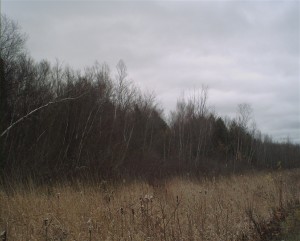Nov 05 2010
Stark Landscape
 Suddenly the leaves are gone. They’re on the ground, that is, and the lush forest has turned into so many sticks. At the same time, we are now spending a third of our waking hours in the dark, and daylight is muted by clouds that appear to be more common this time of year. The surrounding countryside, ablaze with color just a few weeks ago, is suddenly all brown and gray.
Suddenly the leaves are gone. They’re on the ground, that is, and the lush forest has turned into so many sticks. At the same time, we are now spending a third of our waking hours in the dark, and daylight is muted by clouds that appear to be more common this time of year. The surrounding countryside, ablaze with color just a few weeks ago, is suddenly all brown and gray.
Here in northern Vermont, the harshness of November comes hard and fast. I’m never quite ready for it. I raked leaves yesterday, thoroughly enjoying brisk air while doing so, but a cold rain began a few hours after I finished. Good chance that the rain will turn to snow today. That means I got that task done just in time.
The physical landscape isn’t the only thing that looks dreary. The political landscape these days is just as stark. An angry, frustrated electorate voted out Democrats and voted in Republicans this week, causing a transfer of power in the House. Why? Because of the bad economy, of course. Wall Street might be doing okay, but unemployment still hovers around ten percent, consumer confidence is still down, and foreclosures continue. Uncertainty persists. The general sentiment is that the Democrats have failed us. Can the Republicans do better? Probably not, but some kind of change is needed. The desperation is palpable.
If I had any solutions to our country’s woes, I’d run for office. But I’m fresh out of ideas, as most thinking folks are. All I know is that Washington gridlock will only prolong the pain, preventing any significant change from occurring. Democrats and Republicans will drag out the same old ideological arguments, and the economy will limp along for another two years. Yeah, a stark landscape to say the least.
The seasons change and most of us find ways to adapt. That much is certain. Not being a big one for winter sports, I’ll do more thinking and writing in the long months ahead, and get outdoors less. That’s not necessarily a bad thing.
As for the bigger picture, well, I’ll try not to stress out about it. We had our chance to vote. Now things must simply run their course. Enough said. Just don’t expect be to break into song when the Powers That Be offer me a tax cut. I know all too well that, in the long run, that won’t fix a damned thing.
Comments Off on Stark Landscape

